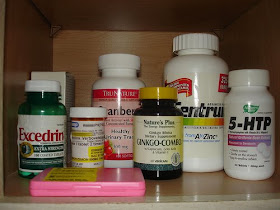
Decluttering your medicine cabinet? Here's something I just learned today: You may want to hold onto medications, even after the expiration date has passed.
Johns Hopkins has an article on this topic, which starts with this:
Think of expiration dates - which the U.S. Food and Drug Administration (FDA) requires be placed on most prescription and over-the-counter medications - as a very conservative guide to longevity. The expiration date is a guarantee from the manufacturer that a medication will remain chemically stable - and thus maintain its full potency and safety - prior to that date. Most medications, though, retain their potency well beyond the expiration date, and outdated medications, whether prescription or over-the-counter, are not usually harmful.There are some important exceptions and some qualifiers - so please read the whole article (and the related one from the Harvard Medical School Family Health Guide). And as Johns Hopkins notes: "If in doubt, consult a pharmacist." (Thanks to Deb in my local Freecycle group for the pointer to the Harvard Medical School article)
Oh, and that "medicine cabinet" might better be something other than the one built into the bathroom. To again quote Johns Hopkins:
The heat and humidity from showers and baths can cause medications to break down, lose potency, and, in rare cases, even become toxic. To keep your medications in the best condition, keep them in a dry area away from heat and light, such as a dresser drawer.Disclaimer: Obviously, I am not a doctor; I'm just passing along information I've read. So check with your own medical professionals!
[photo by Allie Verbovetskaya, licensed under Creative Commons]
I take medication that comes in a 30 pack, and I generally only need 2 tablets every 6 months or so. I keep them on hand because when I need them, I NEED them.
ReplyDeleteI realised my last lot were 18 months past their expiration date, so I checked with my GP. She ummed and ahhed and finally decided to give me a new prescription. She didn't seem overtly concerned though.
Personally, I would never use liquid medications past their use by dates, particularly eye drops. Chemicals react much easier in liquid than in solid form.
SueBK, both Johns Hopkins and the Harvard Medical School mentioned that liquid antibiotics were one classification of medication where expiration dates were important. Insulin was another such medication.
ReplyDeleteYeah, I'd definitely toss any expired eye drops. That's a very different kind of thing than something like aspirin.
Hey there! I'm lucky in that I take so few medications and turnover is high: disprin just gets replaced when it runs out!
ReplyDeleteShame we don't date stamp other stuff - might make the decision making easier. :-) At least with meds, it gives us an indictation of the frequency of use too. For example, something like an antiseptic gargle for sore throats that expires next month, you can always say, I get a fresh one if I get crook this winter. I know the dates are just a guideline, but sometimes you just know that by the time you get around to using the remained it will be *years* away!
Well, I have little kids and can't store my meds in a drawer. So they're on top of the fridge even though I know it's not a good place for them. But better than getting into my little ones' hands!
ReplyDeleteAnonymous, I totally agree that safety - keeping meds away from your little ones - needs to come first!
ReplyDelete